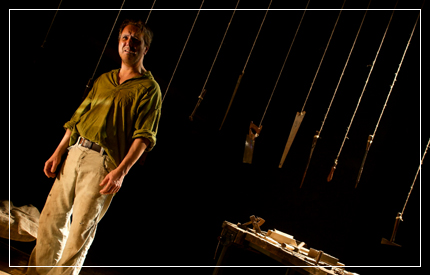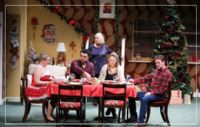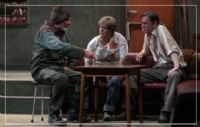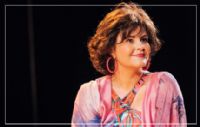The Virgin Father
Date: 01/04/2016
Theatre Review

Jimmy McAleavey's The Virgin Father is a tricky play to get one's head around, and not just because of the possible controversy within the title and the production. Does it want to be an alternative point of view on the Greatest Story Ever Told, the birth, life, crucifixion and resurrection of Jesus Christ? Or does it want to follow the well-trodden path of a solitary man wrestling with his own demons about life and love? In the end, it tries to have it both ways, and there is a conflict in tone, especially in its second half, that casts an unfortunate uneasiness over what qualities the play undoubtedly has.
It's a revival for McAleavey, the literal resurrection of a play that was penned in 2008, premiered the following year to a great reception, and now finds itself touring Northern Ireland before finishing with a week's run at Belfast's Lyric. It is also, despite its fundamental tonal problems, a personal triumph for Scottish actor Stewart Ennis, who digs deep into the rarely talked about life and soul of St. Joseph to present a character full of heart and energy.
The Virgin Father is a one-man show, a story of a guy named Joe who met and married a girl named Mary, even though she was carrying someone else's child. Her delusions about the pregnancy and the child's desires to join a cult are unpreventable, as is his descent into a spiral of madness which only he can save himself from.
There is potential here for a gripping psychological, explorative drama, and when the script stays closer to Joe's inner soul than his outer conflicts, it comes very close to delivering on that front. Ennis's line delivery is laced with astonishing unfairness, bitterness and hopelessness in Joe's battle to banish his bad and troublesome memories through forceful voice. We feel Joe's confusion as he ruminates over whether or not he genuinely loved Mary in addition to his inability to connect with the grown child and his beliefs. St. Joseph's apparent inadequacy in this family circle, his position as a "forgotten man" in the New Testament, could hardly have been better presented.
But, to these eyes, The Virgin Father is more compelling within than without. Once the cat that was never really out of the bag to begin with is officially unleashed, what follows is something dangerously close to a by-the-numbers recounting of an enduring, larger-than-life story from a guy who really ought to be more interesting than the play allows him to be. If there is any serious controversy, I don't see it; the subject of Jesus is treated from a relatively respectful distance, despite a few clever attempts at subversion. The script is simply not very sure-footed, flip-flopping between analysis of the self and periodic recollections.
Even so, Ennis and director Michael Duke never let up. With the material doing both director and star fewer favours as the play proceeds, Ennis's intensity rises. His very features ache with hunger and pain as he continuously contemplates the true meaning of Mary's mental state, the crucifixion and more. All his attempts to physically, verbally and emotionally expunge the agony and discomfort of indecision and neglect take their toll; we are left with a broken man whose journey has mirrored the very uncertainty in McAleavey's script. Hence I have no doubt that one will feel something by the time he or she exits The Virgin Father, though I do wonder if they will quite be able to put their finger on what they felt. It is that kind of play.
Simon Fallaha
The Virgin Father runs at Belfast's Lyric Theatre from Tuesday March 29 to Saturday April 2.
It's a revival for McAleavey, the literal resurrection of a play that was penned in 2008, premiered the following year to a great reception, and now finds itself touring Northern Ireland before finishing with a week's run at Belfast's Lyric. It is also, despite its fundamental tonal problems, a personal triumph for Scottish actor Stewart Ennis, who digs deep into the rarely talked about life and soul of St. Joseph to present a character full of heart and energy.
The Virgin Father is a one-man show, a story of a guy named Joe who met and married a girl named Mary, even though she was carrying someone else's child. Her delusions about the pregnancy and the child's desires to join a cult are unpreventable, as is his descent into a spiral of madness which only he can save himself from.
There is potential here for a gripping psychological, explorative drama, and when the script stays closer to Joe's inner soul than his outer conflicts, it comes very close to delivering on that front. Ennis's line delivery is laced with astonishing unfairness, bitterness and hopelessness in Joe's battle to banish his bad and troublesome memories through forceful voice. We feel Joe's confusion as he ruminates over whether or not he genuinely loved Mary in addition to his inability to connect with the grown child and his beliefs. St. Joseph's apparent inadequacy in this family circle, his position as a "forgotten man" in the New Testament, could hardly have been better presented.
But, to these eyes, The Virgin Father is more compelling within than without. Once the cat that was never really out of the bag to begin with is officially unleashed, what follows is something dangerously close to a by-the-numbers recounting of an enduring, larger-than-life story from a guy who really ought to be more interesting than the play allows him to be. If there is any serious controversy, I don't see it; the subject of Jesus is treated from a relatively respectful distance, despite a few clever attempts at subversion. The script is simply not very sure-footed, flip-flopping between analysis of the self and periodic recollections.
Even so, Ennis and director Michael Duke never let up. With the material doing both director and star fewer favours as the play proceeds, Ennis's intensity rises. His very features ache with hunger and pain as he continuously contemplates the true meaning of Mary's mental state, the crucifixion and more. All his attempts to physically, verbally and emotionally expunge the agony and discomfort of indecision and neglect take their toll; we are left with a broken man whose journey has mirrored the very uncertainty in McAleavey's script. Hence I have no doubt that one will feel something by the time he or she exits The Virgin Father, though I do wonder if they will quite be able to put their finger on what they felt. It is that kind of play.
Simon Fallaha
The Virgin Father runs at Belfast's Lyric Theatre from Tuesday March 29 to Saturday April 2.





































